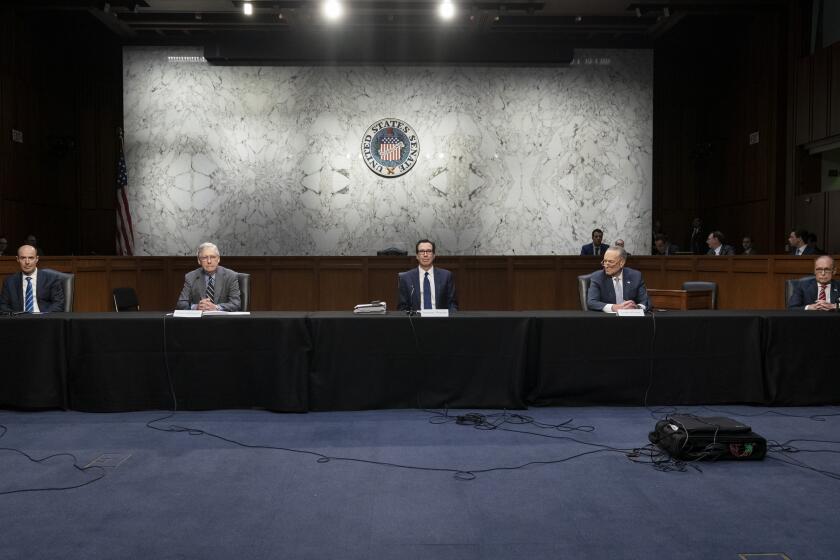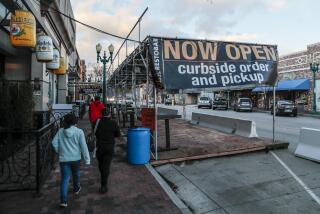As California shelters at home from coronavirus, construction of housing goes on

- Share via
A day after Gov. Gavin Newsom ordered Californians to stay home to prevent the spread of the deadly coronavirus, construction workers reported for duty in the Palms neighborhood of Los Angeles.
At Motor Avenue and Tabor Street, a worker hammered away Friday on the top of a 42-unit apartment building that, when complete, will include four homes for very-low-income households.
At street level, workers guided traffic so a forklift could pick up giant pieces of lumber and deposit them for workers on top. A superintendent, sporting blue protective gloves, looked on.
In other words, minus the gloves, nothing out of the normal.
“People need housing,” said the superintendent, Ron Troyan.
Similar scenes played out across the state. Newsom’s Thursday night order labeled construction -- including but not exclusive to housing construction -- an essential service that could continue. The governor has also issued guidance saying that, beyond the workers actually doing the building, those in construction “operation, inspection and maintenance” are also exempt.
The governor’s office didn’t explicitly lay out the reason it deemed construction essential. But before the coronavirus erupted, California’s most pressing issue arguably was its well-documented housing shortage. And even as the world has shifted over the last few weeks, housing availability remains a big problem.
Business operators are sad and confused by coronavirus-fighting stay-home orders that have deemed their life’s work not essential. But they’re on board.
Government officials are scrambling to house the homeless amid the pandemic. Low-income residents who live in overcrowded apartments will find it more difficult to maintain distance if someone they live with falls ill.
Also, there’s the disruption that would be created in halting construction. Many buyers commit before a new home is completed, and they might have already given notice to a landlord or sold their old home.
“I am entirely supportive of the need to continue to build during this time period,” said Assemblyman David Chiu (D-San Francisco), the author of many recent housing bills. “The construction industry is adapting to the new normal and figuring out how to build the shelters, navigation centers, affordable housing and other types of housing that we need. We can’t slow down.”
As Dan C. Dunmoyer, president of the California Building Industry Assn., said: “You can’t shelter in place with no shelter.”
Although cities such as Boston have halted most construction, that hasn’t been the case in California. Previous orders to stay inside, issued in the San Francisco Bay Area, exempted housing and other types of construction.
So did an order Los Angeles Mayor Eric Garcetti issued Thursday evening, shortly before Newsom made his announcement. The mayor’s office said city services that support development “are continuing to operate.”
“Construction is essential to the economy,” Garcetti’s spokesman, Alex Comisar, said in an email.
California has no clearinghouse yet to help businesses interpret Newsom’s stay-at-home order.
According to the California Employment Development Department, nearly 900,000 people work in the construction industry statewide. And real estate data firm CoStar Group had expected 31,483 multifamily units to be finished this year in California.
Schon Tepler Group has 10 apartment projects under construction in Los Angeles, totaling 175 units. If the company was ordered to stop building, it would still have to pay carrying costs such as loan interest, insurance and property taxes, said Paul Schon, co-founder of the company.
Stopping “would cause a big financial hit to us and our investors,” he said.
Dunmoyer said it’s his understanding the governor’s order still allows people to look at new homes. And he said construction can continue safely.
City inspectors can come through homes by themselves. And, he said, “there are very few construction jobs that require extreme close proximity — generally speaking [workers] are six, eight, 12 feet apart from each other.”
Labor officials agreed. “Construction sites aren’t like office buildings,” said Ron Miller, executive secretary of the Los Angeles/Orange Counties Building and Construction Trades Council. Members “are not working on top of each other in cubicles.”
Some extra precautions are being taken nonetheless, including adding hand-washing stations and performing extra cleaning of construction sites, Miller said.
At the Palms construction site, a worker said he and others are keeping six feet of distance. Troyan, the superintendent, said hand sanitizer is available on-site, while some workers are using gloves and masks.
Asked why some workers didn’t have those on, he cited a common refrain: “We can’t find any.”
On the sales side, Dunmoyer said home builders are asking buyers who come to inspect their finished houses to text them when they arrive.
“It’s kind of rude, but everybody gets it,” he said. “We actually don’t even greet you. We just like wave at you, we unlock the door, we leave and you go into your house and you inspect it.”
KB Home, one of the nation’s largest home builders, announced this week that it shut down its sales centers. The company, which builds as people order homes, is still open for sales through email and phone, and people can tour models virtually, company spokesman Craig LeMessurier said Friday. KB Home will also continue to close on sales of homes that are finished.
The rift between the experience of those able to work from home and those in the service sector, now out of work, shows how the coronavirus outbreak will only exacerbate income inequality in America.
Asked to comment on whether KB Home was stopping construction, LeMessurier noted the governor has deemed construction essential and that “for homes that are not yet completed, we are bringing them to a protective state for that stage of construction.” He declined to elaborate.
Lennar Corp., another national home builder, said this week that given all the uncertainty surrounding the economy, it was pausing land purchases, but that sales and construction would continue.
“Although our business has not shut down, we are keenly aware that this landscape can change very quickly,” Stuart Miller, the company’s executive chairman, said during an earnings call with Wall Street analysts Thursday.
Before the governor’s order, Woodside Homes was building several hundred homes across California and still had people strolling through sales offices.
Chief Executive Joel Shine said the company will continue work on those homes and expects to start construction on more. But as of Friday, across all its California locations, it stopped allowing anyone to just come by for a tour. Access is now by appointment only, and only “after they have satisfactorily answered a series of questions pertaining to potential Covid-19 exposure,” Shine said, using the name of the disease caused by the coronavirus.
He said the change wasn’t made in response to the governor’s order but rather in the “best interest of our employees.”
“If you call me tomorrow, I [probably] will make more changes,” Shine said. “The rules change and the reality in the field changes.”
Times staff Writer Liam Dillon contributed to this report.
More to Read
Sign up for Essential California
The most important California stories and recommendations in your inbox every morning.
You may occasionally receive promotional content from the Los Angeles Times.









